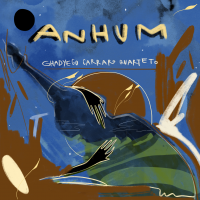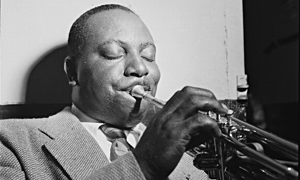Home » Jazz Articles » Book Review » Da Capo Best Music Writing 2002 & 2003
Da Capo Best Music Writing 2002 & 2003
The Da Capo Best Music Writing series is an excellent way to see how one describes a polar bear in a snowstorm to a blind man.
 I have been trying to write this review for the past two months. The Da Capo Best Music Writing series was started in 2000 and I previously reviewed in these pages the first two volumes, Da Capo Best Music Writing 2000 & 2001. Like those two volumes, the 2002 and 2003 editions of the series host precious few articles on jazz, and those are again by the usual suspects. Far and away the biggest difference between these two installments and the previous two is the inclusion of Hip-Hop pieces. Rap and Hip Hop culture has become a hot journalistic commodity. The hip Hop journalism that results is like the music and culture it sets out to define?it is in-your-face detached, profane, divine, and informative. What it is not is particularly focussed and I suspect that is by design. That said, I recommend that the reader look at Nic Cohn?s ?Soljas? (Granta) and Franklin Bruno?s ?The New DJs Lexicon? (Feed) for the 2002 edition and Terry McDermott?s ?Parenteral Advisory: Explicit Lyrics? (Los Angeles Magazine) and G. Beato?s ?Not Bad for a White Girl? (Spin) from the 2003 edition.
I have been trying to write this review for the past two months. The Da Capo Best Music Writing series was started in 2000 and I previously reviewed in these pages the first two volumes, Da Capo Best Music Writing 2000 & 2001. Like those two volumes, the 2002 and 2003 editions of the series host precious few articles on jazz, and those are again by the usual suspects. Far and away the biggest difference between these two installments and the previous two is the inclusion of Hip-Hop pieces. Rap and Hip Hop culture has become a hot journalistic commodity. The hip Hop journalism that results is like the music and culture it sets out to define?it is in-your-face detached, profane, divine, and informative. What it is not is particularly focussed and I suspect that is by design. That said, I recommend that the reader look at Nic Cohn?s ?Soljas? (Granta) and Franklin Bruno?s ?The New DJs Lexicon? (Feed) for the 2002 edition and Terry McDermott?s ?Parenteral Advisory: Explicit Lyrics? (Los Angeles Magazine) and G. Beato?s ?Not Bad for a White Girl? (Spin) from the 2003 edition. That out of the way, there remains provocative writing in both releases and in is in sources common to both editions. The Village Voices? Gary Giddins is represented in both with his 2002 article on Louis Armstrong, ?Boom? (Village Voice) and his 2003 ?Post ?War Jazz: An Arbitrary Roadmap? (Village Voice). The latter is a list article that selects important recordings made in each year between 1945 and 2001 (Charlie Parker to Jason Moran) (Village Voice). Lists appear in the 2002 collection with Steve Erickson?s ?L.A.?s Top 100? (Los Angeles Magazine). Erickson details the 100 most important recordings to the culture of Los Angeles, beginning with Beck?s ?Loser? at number 100 and Sam Cooke?s ?A Change is Gonna Come? at number 1. The Onion makes it?s presence known with inclusion in both collections as does Greil Marcus, who?s 2002 interview will Kelly Hogan (?Days Between Stations: Kelly Hogan?) is at once empathic and insightful. Marcus? 2003 submission weaves Walter Mosely prose with Los Angeles in the 1950s.
 The most notable articles for our readership are those that are Jazz or allied-genre musics. Matthew C. Duersten?s lengthy article in Flaunt on Anita O?Day (?The Moon Looks Down and Laughs?) is the finest writing in the 2002 edition. It provides keen insight into this controversial and important jazz artist?s life since the publication of her autobiography, High Times, Hard Times (Limelight, 1989). Needless to say, like Keith Richards, Miss O?Day has been living on gravy time for the past 20 years. Also, needless to say, Miss O?Day is the greatest living female jazz vocalist. Duersten?s sizzling prose captured the triumph of Miss O?Day?s appearance at the 1958 Newport Jazz Festival as captured in perhaps the first jazz documentary, Jazz on a Summer?s Day:
The most notable articles for our readership are those that are Jazz or allied-genre musics. Matthew C. Duersten?s lengthy article in Flaunt on Anita O?Day (?The Moon Looks Down and Laughs?) is the finest writing in the 2002 edition. It provides keen insight into this controversial and important jazz artist?s life since the publication of her autobiography, High Times, Hard Times (Limelight, 1989). Needless to say, like Keith Richards, Miss O?Day has been living on gravy time for the past 20 years. Also, needless to say, Miss O?Day is the greatest living female jazz vocalist. Duersten?s sizzling prose captured the triumph of Miss O?Day?s appearance at the 1958 Newport Jazz Festival as captured in perhaps the first jazz documentary, Jazz on a Summer?s Day:
Another superb bit of writing form the 2002 collection is from the first of two articles eulogizing Joey Ramone, Lenny Kaye?s ?A Ramone Leaves Home: Joey 1951-2001? (Village Voice):
That is crackling good writing.
The 2003 edition, edited by Simpsons creator Matt Groening, does not contain writing this crystalline, but does sport some interesting writing nevertheless. The standout essay is Michael Hall?s Texas Monthly article ?Mack McCormick Still Has the Blues.? Here, Hall details the triumphs and tragedies of McCormick?s scholarship. It is the latter of these most poignantly presented, detailing the death of McCormick?s greatest potential work— that of documenting blues legend Robert Johnson?s life: Biography of a Phantom and His still incomplete epic, Texas Blues. Both will more than likely remain unpublished, as Mr. McCormick no longer gives a shit, ostensibly because of a bipolar depressive disorder. The most fun and enjoyable article is by none other than Elvis Costello, ?Rocking Around the Clock? (Vanity Fair) where Mr. Costello suggests music listening for every hour of the day.
I preferred the first two editions of this series, but these two also have their charms. The Da Capo Best Music Writing series is an excellent way to see how one describes a polar bear in a snowstorm to a blind man.
Best Music Writing 2002
Guest Editor Jonathan Lethem
Series Editor Paul Bresnick
Da Capo Press
ISBN: 0-306-81166-9
Best Music Writing 2003
Guest Editor Matt Groening
Series Editor Paul Bresnick
Da Capo Press
ISBN: 0-306-81236-1
Tags
PREVIOUS / NEXT
Support All About Jazz
 All About Jazz has been a pillar of jazz since 1995, championing it as an art form and, more importantly, supporting the musicians who make it. Our enduring commitment has made "AAJ" one of the most culturally important websites of its kind, read by hundreds of thousands of fans, musicians and industry figures every month.
All About Jazz has been a pillar of jazz since 1995, championing it as an art form and, more importantly, supporting the musicians who make it. Our enduring commitment has made "AAJ" one of the most culturally important websites of its kind, read by hundreds of thousands of fans, musicians and industry figures every month.
























